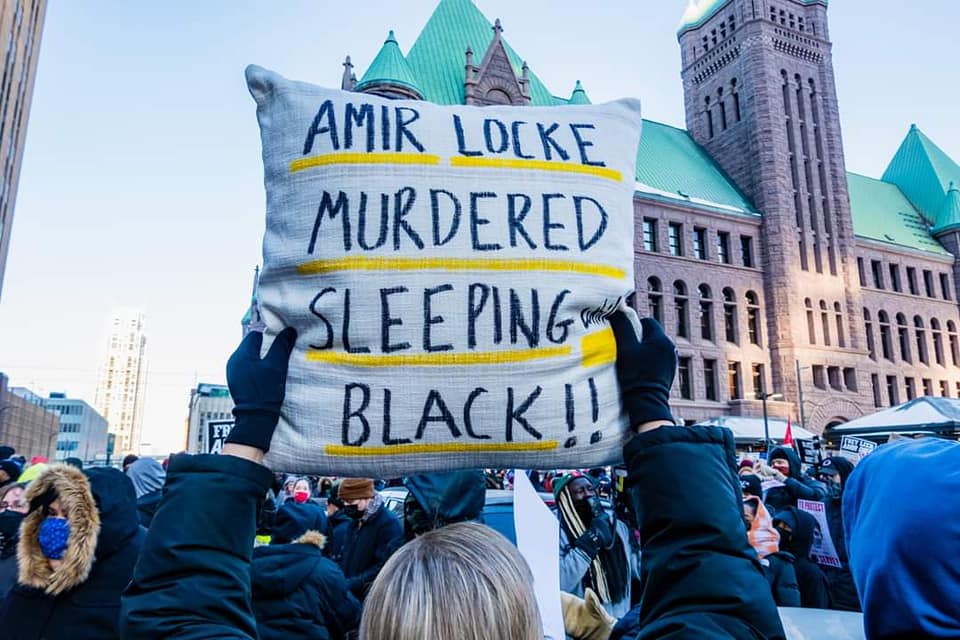
At 7 a.m. local time on Thursday February 3, 2022, Minneapolis SWAT executed a no-knock warrant and entered the apartment where Amir Locke, 22, was sleeping on a couch. As captured on body cams, Officer Mark Hanneman shot Locke three times within nine seconds of entry into the apartment. Locke was not the target of the warrant, and he was in legal possession of a firearm. He was executed without ever getting off the couch, or appearing to fully waking up.
The news media keeps repeating that the “SWAT team raid” of the Bolero Flats Apartment Home where Locke was sleeping on a relative’s couch was related to a homicide investigation. This is irrelevant. Amir Locke was not named in the warrant. The police were not looking for him. Now, police are trying to caste blame on Locke by saying he was a “suspect,” without specifying for what crime. Being a “suspect,” sleeping on a couch, and legally owning a gun are not justifications for callous police murder, echoing the similar executions by police of George Floyd in Minneapolis and Breonna Taylor in Louisville, KY, both in 2020.
Ben Crump, an attorney retained by Locke’s family, said, “He did what any other law-abiding, permit-gun owner would do. Strange people bust in this house, awaken him from his sleep. And he reached for his weapon . . . he has a Second Amendment right to defend himself.”
Michelle Gross with Communities Against Police Brutality said, “From what we understand, the gentleman was startled when people came blasting through his door, and he did what legal gunowners do. He attempted to defend himself and this is how he ended up dead.”
The police murder of Black legal gun carriers is rampant. For example, a reporter notes that in 2018 “police in Alabama shot to death a Black man with a gun, making it the second time in November that police shot and killed a Black man with a gun. In each case, police later admitted that they killed the wrong Black man. Also, they killed men who were risking their lives to save others.”
In another case, a 21-year-old Black U.S. Army veteran “armed with a pistol was attempting to keep innocent bystanders away from a fight when a police officer seeing the gun, shot and killed him.” The next day, police admitted they had killed “the wrong person,” implying that there was a “right” person to kill.
Responding to the shooting of Locke, Minneapolis Mayor Jacob Frey said, “Let’s start with the reality that any loss of life is tragic, . . . And that’s where we’re keeping our thoughts front and center as we work alongside our community partners, and as the investigation gets under way.”
That sentiment may be intended to defuse community tensions and focus attention on the rightful grief that the family and community feel, especially given the history of police murders of Black people by Minneapolis police. However, that same history demands a different response from the mayor. This killing is part of a systemic, repetitive, ongoing pattern of police murders of Black people.
The mayor has imposed an immediate moratorium on the request and execution of no-knock warrants except in cases of imminent threat. That loophole is big enough for a SWAT team to plow through. There is a focus in much of the media on the “no knock” nature of the warrant, and no-knock warrants should not exist. However, ending no-knock warrants will not resolve the systemic, repetitive murders of Black youth in Minneapolis or elsewhere.
The National Alliance Against Racist and Political Repression (naarpr.org) says:
The people are demanding change and proposals and slogans abound. But first and foremost, this historic moment demands that Black, Puerto Rican, Chicano/Mexicano, and other oppressed communities in the United States give ourselves historic new rights and power. Our communities have the right to be free of police tyranny. Defending that right requires the power to control the police, instead of being controlled by them. Before we can talk about police reforms, communities first have to take power to control and reform the police themselves. That requires that we directly elect civilian police accountability councils (CPACs) who will defend our rights, independent of the political masters who today use the police to serve their ends.
Joe Sims, Co-Chair of the CPUSA, said, “Tired attempts to control specific police techniques do not get to the fundamental issue; the police too often act as an occupying force in Black communities and without regard for the Black lives they are formally sworn to protect and serve.”
Image: Black Lives Matter, St. Paul, MN (Facebook).


 Join Now
Join Now